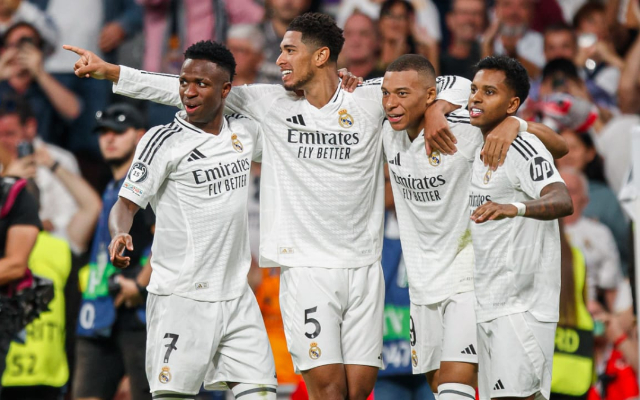
RevSportz Comment
The marathon first round of UEFA Champions League matches has come and gone, with 18 matches played across three midweek nights in the revamped format. A brave new world, or merely old wine in a new bottle? Apart from Sparta Praha and Bayer Leverkusen – beaten by Zinedine Zidane’s wonder goal in the 2002 final – each of the teams in the nascent top eight is a former winner. Real Madrid, serial champions, lurk in ninth.
Any shocks or surprises? Not really. Barcelona losing to Monaco away was an eyebrow-raiser, but that was largely the result of a daft red card for Eric Garcia in the 10th minute. Even otherwise, Hansi Flick’s Barca are a work in progress and the number of unknowns on the substitutes’ bench spoke volumes of how financial mismanagement has affected a club that dominated the competition for a decade when Lionel Messi was in his prime.
Manchester City being held at home by Internazionale was another surprise, but Simone Inzaghi’s side are the pick of an average Italian bunch. Given that they made the final in 2022-23, losing to a record-breaking City side, Inter’s point at the Etihad can hardly be considered an upset.
In another era, AC Milan being outclassed 3-1 at home would have been headline news, but you only had to look at the quality that Liverpool could throw on in comparison to their hosts to see why the result barely caused a ripple.
One reason given for the new structure, and four more teams, was the greater opportunity it affords to sides from ‘weaker’ nations. Two more guaranteed matches mean more money for the coffers. What it won’t do is bridge the yawning chasm between the haves and have-nots.
For the Latest Sports News: Click Here

No result was more depressing than Dinamo Zagreb’s 9-2 thrashing at the hands of Bayern Munich. Time was when teams from behind the so-called Iron Curtain were more than a match for the best of the west. With Andrei Shevchenko and Serhiy Rebrov at their best, Dynamo Kiev thrashed Barcelona 3-0 at home and 4-0 away in the 1997-98 season. Going further back, during a decade when they were Europe’s best, Liverpool thrice came unstuck against Eastern European opposition – Dinamo Tbilisi (Georgia), CSKA Sofia (Bulgaria) and Widzew Lodz (Poland).
These days, such clubs either toil in anonymity far away from the Champions League or end up training young talent for Europe’s biggest clubs to cherry-pick. Nothing in the opening round of fixtures suggested a shock winner. Come the business end of the competition, and it will be the usual suspects.
In nearly 70 years of European competition, teams from only ten nations have lifted the biggest prize in club football. Of those, the now-defunct Yugoslavia (Red Star Belgrade), France (Marseille), Scotland (Glasgow Celtic) and Romania (Steaua Bucharest) won it just once. Despite winning it a record 20 times, Spain have been represented only by Real (15) and Barcelona (5) on the winner’s podium. While Germany have eight wins, six of those have been Bayern’s. Italy’s 12 have been shared between the big three of AC Milan (7), Inter (3) and Juventus (2).
In fact, you have to go back to Jose Mourinho and Porto in 2003-04 for the last time a team from outside Europe’s big four leagues won the tournament. Only one team from outside Spain, England, Germany and Italy has even made the final in that time, and that was Paris Saint-Germain (PSG) in the Covid-affected season of 2019-2020.
In the 21st century, there have been only two new names on the trophy – Chelsea and Manchester City. Neither could remotely be classed as an underdog, given the continued scrutiny there is of how their owners’ seemingly limitless wealth was used for what many other clubs consider financial doping.
That Celtic sit second in the table, at least for a fortnight, is a reminder of the magic European football used to have. Their triumph over mighty Inter in the 1967 final – with a team of players all born in and around the city – remains the central chapter in any book of underdog successes. But new format or not, the miracle that the great Jock Stein masterminded is unlikely to ever be repeated.
Also Read: Fearless approach sets this generation apart: Surya Shekhar Ganguly




